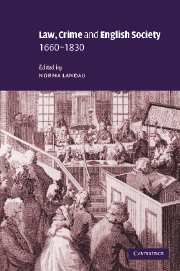Book contents
- Frontmatter
- Contents
- List of figures
- Notes of contributors
- 1 Introduction
- Part 1 Law
- Part 2 Crime
- Part 3 Society
- 8 After Somerset: Mansfield, slavery and the law in England, 1772–1830
- 9 Religion and the Law: evidence, proof and ‘matter of fact’, 1660–1700
- 10 The press and public apologies in eighteenth-century London
- 11 Origins of the factory acts: The Health and Morals of Apprentices Act, 1802
- John M. Beattie's publications
- Index
10 - The press and public apologies in eighteenth-century London
from Part 3 - Society
Published online by Cambridge University Press: 30 June 2009
- Frontmatter
- Contents
- List of figures
- Notes of contributors
- 1 Introduction
- Part 1 Law
- Part 2 Crime
- Part 3 Society
- 8 After Somerset: Mansfield, slavery and the law in England, 1772–1830
- 9 Religion and the Law: evidence, proof and ‘matter of fact’, 1660–1700
- 10 The press and public apologies in eighteenth-century London
- 11 Origins of the factory acts: The Health and Morals of Apprentices Act, 1802
- John M. Beattie's publications
- Index
Summary
On 16 November 1769 the following advertisement appeared in London's Daily Advertiser:
Whereas I, Joseph Chandler, of Crofts-Yard, in Princes-Street, Lambeth, did some Time since, without Cause or Provocation, abuse and very ill treat Mrs Ann Cornthwaite, of the Fore-Street, in Lambeth, for which she commenced an Action against me, but being sensible of my Guilt, and on my publickly asking her Pardon in this Paper, she has ordered her Attorney to stop Proceedings; and I do so promise never more to molest, abuse, or disturb her. As witness my Hand, November 15, 1769,
joseph chandlerThis apology, and the hundreds more like it that appeared in the London press between the 1740s and 1790s, give us a glimpse into the nature of altercations and one form of conflict resolution in eighteenthcentury London. It is not surprising that, given London's urban density, Londoners got into innumerable scrapes with one another. Some of these were serious, and were dealt with by the criminal and civil courts. Many more were resolved by conciliation, involving magistrates, neighbours, friends and family of the involved parties. Such resolution could be a substitute for the more formal avenues of recourse, or could be entered into during the legal processes, as a way of curtailing or bringing them to a close. We know that in the eighteenth century many cases which were brought to the magistrates either did not proceed further or were terminated before the courts delivered a verdict.
- Type
- Chapter
- Information
- Law, Crime and English Society, 1660–1830 , pp. 208 - 229Publisher: Cambridge University PressPrint publication year: 2002
- 2
- Cited by



